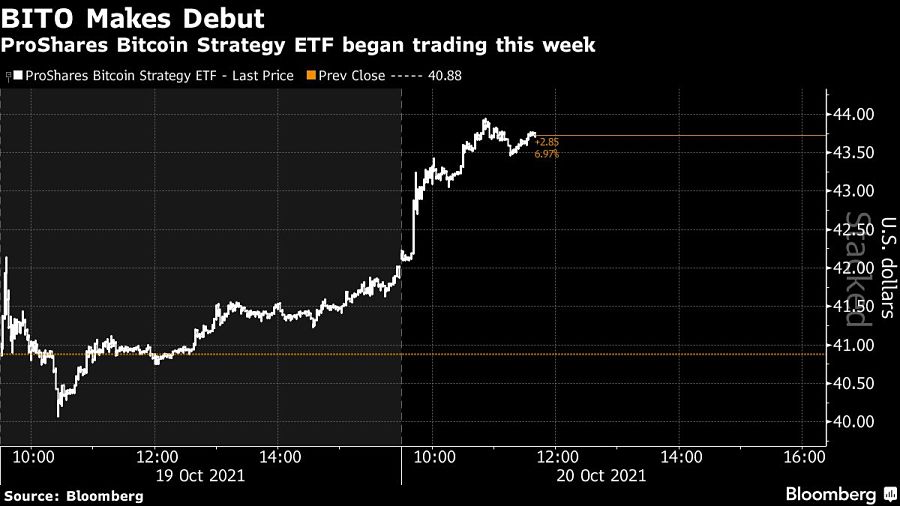

The race is on to cut costs on U.S. Bitcoin futures exchange-traded funds, just a day after the first ETF launched.
VanEck’s pending Bitcoin Strategy ETF (XBTF) will carry a management fee of 0.65%, meaning $6.50 for every $1,000 invested. That would undercut the 0.95% expense ratio on ProShares Bitcoin Strategy ETF (BITO), which debuted Tuesday.
The VanEck fund’s effective date is Saturday, Oct. 23, the company said in an updated prospectus. And a VanEck spokesman said the firm anticipates launching it “as soon as practicable” after that.
“The decades-long fee war has a new battle with Bitcoin ETFs,” Todd Rosenbluth, head of ETF and mutual fund research at CFRA, wrote in an email. “When an ETF comes to market second or third with a nearly identical product, it can be at a disadvantage unless it can stand out with a lower fee.”

Fights over fees are nothing new in the booming $6.8 billion ETF industry, as each new fund seeks to gain market share by offering a lower price than the competition. Actively managed funds are able to charge slightly more than passive ETFs, with the average fee for active equity funds clocking in at 0.71%. BITO is actively managed, and the prospectus for XBTF indicates that it will be as well.
“We were the first asset manager to file for a Bitcoin futures ETF, and we are offering what would be most competitively priced ETF when we come to market,” said Ed Lopez, head of ETF product at VanEck.
The 30-basis-point difference in management fees should help the VanEck ETF attract demand, even after the ProShares fund’s record-shattering debut. More than 20 million shares of BITO traded Tuesday, ranking it as the second-busiest ETF launch ever.
“Investors are looking for the cheapest way they can obtain exposure” to Bitcoin, said Mohit Bajaj, director of ETFs at WallachBeth Capital. “Especially if the instruments they are choosing between are correlated.”

The leadership changes coming in June, which also include wealth management and digital unit heads, come as the firm pushes to offer more comprehensive services.

Strategist sees relatively little risk of the university losing its tax-exempt status, which could pose opportunity for investors with a "longer time horizon."

As the next generation of investors take their turn, advisors have to strike a fine balance between embracing new technology and building human connections.

IFG works with 550 producing advisors and generates about $325 million in annual revenue, said Dave Fischer, the company's co-founder and chief marketing officer.

Five new RIAs are joining the industry coalition promoting firm-level impact across workforce, client, community and environmental goals.
RIAs face rising regulatory pressure in 2025. Forward-looking firms are responding with embedded technology, not more paperwork.
As inheritances are set to reshape client portfolios and next-gen heirs demand digital-first experiences, firms are retooling their wealth tech stacks and succession models in real time.
